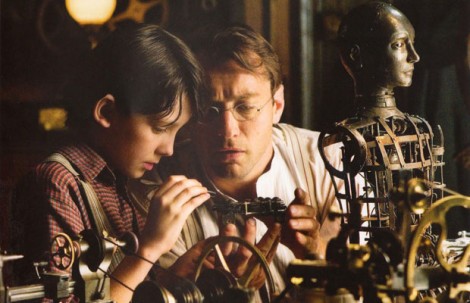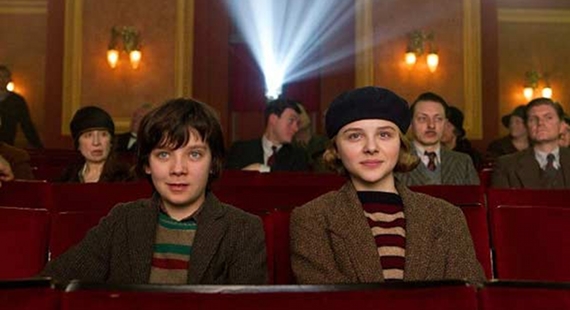Hugo is a fairy tale about two children finding their place in the world directed by a man who is known for: killing his characters, butchers, mental institutions, guys urinating in glasses, mafia bombing, stalkers, boxers, mentally deranged taxi drivers…
The story of something different
When a director leaves his comfort zone there is always a risk and a possible failure. Maybe you realize that the director is basically a one trick pony and when he tries something else he is completely incompetent. Maybe this leads to the director never trying anything new again and relying on warming up his past works without bringing something new to the table.
On the other side doing something completely new might show you why this person is considered to be such a great director – maybe by doing something completely new he can grow and extend his skills, show his passion that is not depending on his a particular type of story.
The question now is what Hugo means for Scorsese and after the first trailer underwhelmed couldn’t describe how my expectations had lowered. Just what the hell was this movie?
The story of a mechanic
Hugo (Asa Butterfield) is an orphan boy living in a train station in Paris where he watches over all the clocks – because his father (Jude Law) has been a watchmaker before his death. The only remaining connection to his father is a strange automaton that Hugo and his father tried to fix. For this Hugo has to steal parts from George (Ben Kingsley) who owns the station’s toy shop and seems strangely interested in what the little boy is up to.
Trying to repair the automaton leads to Hugo finding George’s goddaughter Isabelle (Chloë Moretz) – a bookworm who has never before seen a motion picture.
Together they try to figure out the secret behind the automaton. What they discover is something Isabelle’s godfather is desperately trying to hide from them which is linked to the history of cinema.
The story of imagination
To say that Scorsese as managed to make a good movie would be an understatement. Hugo is a beautiful treat. From the first shot of the Arc de Triomphe fading into the interior of a clockwork the director takes the audience on a visual journey in a playful – one daresay childish – fascination.
The movie somehow feels very magical and heightened. The city is Paris but it feels like a storybook city, even though there is nothing distinctively magical about it. I had imagined the plot to be very farfetched but it is actually a very plausible storyline – yet all vibrates in a way which I can’t put my finger on to suitably describe it. I don’t know how Scorsese has done it but he has managed something very few directors or storytellers can: to capture the fascination of mechanical instruments.
In popular opinion things like machines are not considered to be things that capture your imagination. As a physicist this is something that particularly concerns me: that science and laws of nature are seen as something trite, stale – something that limits you instead of broadening your worldview.
Scorsese understood this fascination and so Hugo is full of machines which though manmade seem so much more compelling than any recent fantasy creation I have seen. Finding imaginative ways to frame clockworks is no simple task and putting suspense into a scene where two kids watch an automaton is even more difficult.
And this is by no means my personal opinion that I am forcing onto the movie. It is very clear that the director has very similar views. What Hugo manages to bring across is how a machine can be used to capture our imaginations in ways no one would have believed.
The character of Isabelle was a particular delight because she is the bookworm who is living out her imagination by reading. I am sure most people have made the experience that when reading a book and then watching the adaption it seems as if their imagination has been limited, as if the movie version is just a bland form and not even remotely as vast and fascinating as the book.
Because of experiences like this there are a lot of people who have an aversion to movies themselves, seeing them as a limitation of creativity – this goes even further to some people not considering movies on par with books at all.
Isabelle starts out like this – someone who can’t fathom what all the fuss about movies is because after all there are loads of books to not need any movies. But already within the first act Hugo and Isabelle are watching a silent film about a man on a ledge (not the new Sam Worthington movie) and the girl is captivated and moved by it.
The story of cinema
After having been very underwhelmed by The Artist I went into Hugo with even lowered expectations than I had for The Artist (still wishing for the best but trying not to overhype myself). Both movies are very similar. They both deal with the early times of cinema and both have been praised beyond belief (the two movies are often recommended as a “cinema double feature”).
While I really liked the silent movie idea of The Artist the movie fell flat for me after 30 minutes (when they put out their big gun with a fantastic dream scene that the rest of the film would never again life up to). Contrary Hugo just seems richer and richer every time I think about it. Even a 10 page review would probably only get a fracture of all the ideas and symbolism and I desperately wanted to put in as much as possible into the review but this wouldn’t really help. Hugo is a film you need to discover for yourself and I really hope it will captivate you as much as it did me.
After the initial 20 minutes of skepticism I completely fell for the film so much that I was close to tears of joy when the movie wanted me to be or that I would almost shout “no” because the movie wanted me to do so.
 But take this with a grain of salt. Falling into a movie is no easy feat especially not if you heard beforehand. Maybe Hugo will leave you as cold and unimpressed as The Artist left me – but even then you will not be able to stop marveling everything else about it.
But take this with a grain of salt. Falling into a movie is no easy feat especially not if you heard beforehand. Maybe Hugo will leave you as cold and unimpressed as The Artist left me – but even then you will not be able to stop marveling everything else about it.
Hugo is a technical achievement – this is beyond discussion. Even the THREEE DEEE is not annoying, there are a few playful things Scorsese did with 3D and while it was not essential or revolutionizing the way stories are told I did not mind – which seems to be the biggest compliment that THREEE DEEE can get nowadays.
And all this – the incredible compositions, camera moves, effects, nightmare sequences (on par with The Artist) – is just the outside of a marvelously touching story about a group of people so different and unrelated who find together and are linked even though they are not really linked – much like the way a cinema audience is coming together and even if we don’t know who the people behind or in front of us are we are linked by the emotions a great story can cause in a most diverse group.





Schreibe den ersten Kommentar